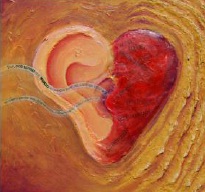

Carotid artery disease: Just as the accumulation of fatty plaque can cause heart disease, the same issue can cause carotid artery disease.Treatment of these blood disorders will vary depending on the disorder in question, so that’s something you’ll definitely want to talk over with a specialist. Blood vessel disorders: There are a wide number of disorders that can cause your blood vessels to become malformed in some way, and this, in turn, can cause pulsatile tinnitus.That’s why you can hear the thump-whump of your heart a little more potently than normal. Any blockages of the ear tend to make internal sounds louder. These are the types of hearing losses that are typically caused by obstructions in the ear (often, that obstruction is fluid or inflammation ear infections are the most common examples). Hearing loss: In many cases, pulsatile tinnitus can be a symptom of conductive hearing loss.But persistent high blood pressure can be a serious condition, and you should definitely talk to your doctor about healthy ways to manage this condition. Hypertension: High blood pressure (known medically as hypertension) is one of the most common causes of pulsatile tinnitus.That seems simple enough, right? But the underlying causes of pulsatile tinnitus can be a little more intricate: Pulsatile tinnitus is the result of turbulent blood flow through the arteries or veins around your ears. If your pulsatile tinnitus sticks around for a while–say, longer than three weeks or so–that might be a reason to believe there are other underlying causes. It might be most noticeable when other things are quiet or when you’ve just engaged in some vigorous exercise. In most cases, though, pulsatile tinnitus is temporary. (There are several blood vessels around the ear which could be the culprit.) What you’re really hearing is the blood whooshing through an artery or vein, and that whoosh happens in time with your heartbeat. In most cases, this is caused by irregular blood flow in one of the blood vessels around your ear. When you hear that thump-whump in your ear, it’s because you’re experiencing pulsatile tinnitus. But it’s also not a great idea to totally ignore your pulsatile tinnitus, especially if it doesn’t go away on its own within a few weeks or so. And, in most cases, it’s nothing to panic about. Unlike some other forms of tinnitus, in which you hear a sound (usually buzzing or humming) and the source of the sound is unclear, pulsatile tinnitus has a physiological source. There’s a name for this sound: pulsatile tinnitus. It’s a sound you never noticed before now, so it understandably makes you a little nervous. Is that… is that normal? You just laid down to bed, turned out the lights, and now you can hear the rhythmic thumping of your heart in your ears.


 0 kommentar(er)
0 kommentar(er)
